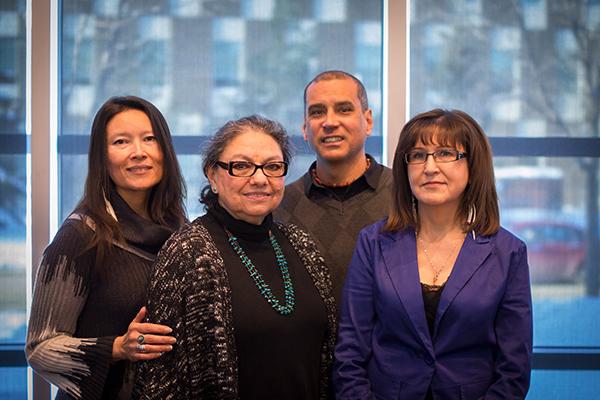Since Canada’s Truth and Reconciliation Commission (TRC) released its report last year containing Calls to Action to redress the legacy of residential schools and advance the process of Canadian reconciliation, post-secondary institutions have sought ways to respond to these recommendations. Dwayne Donald suggests one consideration that should inform these efforts.
“The way I think about it is, with the way things went in residential schools, there was a certain kind of human being that wasn’t valued, that was considered useless to the nation and nationality they were trying to create,” says Donald, a professor of Secondary Education at the University of Alberta. “So the best thing we can do is honour that person, so that when an Indigenous person comes to this place, they don’t have to become someone else in order to be successful.”
As co-chair of the Faculty of Education’s Indigenous Education Council, Donald has helped organize events to bring to campus Indigenous leaders and community members for a conversation about how the U of A can better serve Indigenous people. Donald says a pipe ceremony held in the Education North building last December was intended to invite blessings and guidance for undertaking this process of consultation. A community gathering and circle discussion slated for Friday, March 18 at 10 a.m. in the 4th floor lounge of Education North will continue the process. All are welcome to attend.
““We’ve all been colonized, in the sense that we’ve been brought into an ideological system and raised and educated in that, and most of it is based in colonial logic,” says Dwayne Donald.
“We wanted to think about the Calls to Action in connection to Indigenous people and communities who don’t come to this campus very often, especially children. So the pipe ceremony was meant to instigate a different route,” Donald says. “It’s about trying to get leaders from Indigenous communities in this region to come here and to listen to them. I’m hoping for a pretty organic conversation, and I’m quite sure we’re going to hear some pointed things from our leaders.”
The presence of the past
The TRC Calls to Action include recommendations to educate teachers on how to integrate Indigenous knowledge and teaching methods into classrooms, as well as incorporating information on Indigenous history and contributions, treaties and residential schools into K-12 curriculum.
Donald was part of the group of academics and graduate students who pushed for the creation of EDU 211: Aboriginal Education and the Context for Professional Engagement, a mandatory course to help pre-service teachers understand Indigenous peoples’ history and educational experiences. He says the work of reconciliation can’t begin without acknowledging the colonial underpinnings that persist in our society and culture.
“My view is that we’ve all been colonized, in the sense that we’ve been brought into an ideological system and raised and educated in that, and most of it is based in colonial logic which stems from a fundamental denial of relationships to serve particular needs,” says Donald.
“A lot of the students I encounter, they don’t understand colonialism, as a deeply intimate way of being brought into imagining the world and their place in it. And so I think that would be an important first step is to understand colonialism, its history and how it lives amongst us in different ways.”
Taking a balanced view
To be presented with history that runs counter to the narrative of Canada as a model of justice, peace and good governance can be destabilizing for some non-Indigenous students, Donald says, leaving them “stuck” in guilt or defensiveness over the social privilege they enjoy. Learning about the traditional knowledge of Alberta’s First Peoples can show a way forward, he adds.
“I think the Indigenous worldview and wisdom can provide different ways to proceed. I think that was the vision of the treaties—that there would be this learning from each other, there would be a balanced way of looking at the world,” Donald says.
“This wisdom I’m talking about has been here a long time, so it’s connected to this place. So if you’re going to live here and rely on the resources here, you should know that as well. It shouldn’t be viewed as an imposition, but an opportunity.”
Feature image: Faculty of Education professors (l. to r.) Rebecca Sockbeson, Cora Weber-Pillwax, Dwayne Donald, and Evelyn Steinhauer, photographed in December 2013 when they received a University of Alberta Human Rights Education Recognition Teaching Award for EDU 211.
